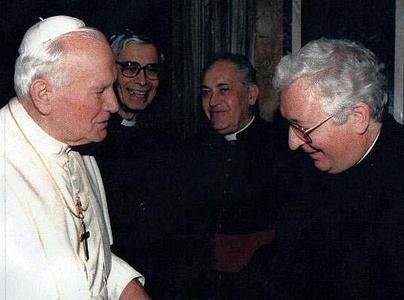When crimes occur, Catholic canon law requires bishops to consider church's image, expert says
By Sandro Contenta
Toronto Star
April 11, 2010
Feature Writer
ROME–The Catholic Church's worry about the scandal sex abuse allegations will cause – often leading to their cover-up – reflects a deeply rooted legal principle that governs the church, a leading canon law expert says.
"The principal of scandal is very important in penal canon law," says Marco Ventura, a professor of religious law at the University of Siena, referring to the Vatican's legal code.
"Preventing scandals from taking place is crucial from all points of view. The bishop is in charge of determining how to fight against scandals which could affect the good image of the church," he added in an interview.
Avoiding scandal was a key concern of the late Bishop Joseph Windle, of Pembroke, Ont., when he wrote a letter to the Vatican about a pedophile priest in 1993.
 |
| Former Monsignor Bernard Prince, right, befriended Pope John Paul II. |
The letter, submitted as evidence this week in a civil case against the Diocese of Pembroke, shows a bishop preoccupied with ensuring there is "little or no danger of any scandal ever emerging."
The pedophile priest, the now-defrocked Monsignor Bernard Prince, was convicted in 2008 of sexually molesting 13 young boys between 1964 and 1984. Most of the incidents occurred in the Killaloe area, near Pembroke in eastern Ontario. Prince is serving a four-year prison sentence in British Columbia.
Prince was promoted to a top Vatican job overseeing missionary groups in 1991, a year after allegations that he abused a boy were brought to the diocese's attention. In his letter two years later to the Vatican's ambassador in Ottawa, Windle wrote that another four children had complained of sexual abuse by Prince.
Yet, Windle told the Vatican's papal nuncio that he agreed with Prince's move to Rome because "it would remove him from the Canadian scene." Windle notes he also told Vatican Archbishop Jose Sanchez, now a cardinal, about the sex abuse allegations before Prince got the Rome posting. Prince retired from his Vatican job in 2004.
A "redeeming factor," Windle wrote, is that the family of one victim is of Polish background, "and their respect for the priesthood and the Church has made them refrain from making these allegations public or laying a criminal charge against a priest.
"Had this happened elsewhere, there would be every danger that charges would have been laid long ago with all the resultant scandal," Windle added.
The Vatican's spokesperson, Rev. Federico Lombardi, refused to comment when asked by the Star about Prince and the Windle letter.
Pope Benedict XVI is under increasing pressure for his handling of sexual abuse scandals that are rocking churches in the United States as well as several European countries.
In an interview Friday with Vatican Radio, Lombardi said the Pope is willing to again meet victims who were abused as children by priests. It is also crucial, he added, that church officials collaborate with civil authorities in cases of sex abuse, and that "correct canon law" be applied.
"Only this way can we think of effectively rebuilding a climate of justice and full confidence in the ecclesiastical institution," Lombardi added.
Ventura describes canon law as a murky penal code where punishment is left to the discretion of church authorities.
It places all power in the hands of bishops on matters in their diocese. When crimes occur, church law requires that bishops weigh the impact of scandal before acting, Ventura says.
"The bishop could say, 'In the name of scandal I act against this criminal or, in the name of scandal I do not,'" he says.
It comes down to which will better protect parishioners and the good image of the church, says Ventura, an editorial committee member of the Ecclesiastical Law Journal, and the author of two canon law books.
The bishop might decide that laying charges against a pedophile priest could help the church by showing the community it takes such matters seriously. Or, he could decide that a cover-up would spare parishioners emotional turmoil and prevent competing churches from using the crimes to lure Catholics away from the fold.
Scores of examples in Ireland, Germany, the United States and Canada, to name a few countries, indicate bishops often decided the latter was more appropriate.
Any original material on these pages is copyright © BishopAccountability.org 2004. Reproduce freely with attribution.